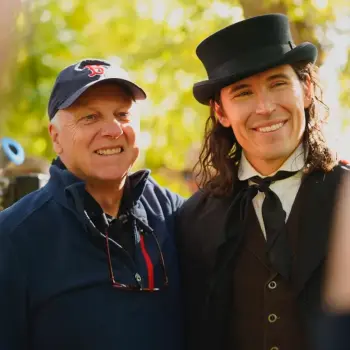Lectionary Reflections
Matthew 19:27—20:16
September 18, 2011
Sometimes I wish I had been alive in the first century to watch and learn and see things firsthand. At other times, I thank God that I was not alive in the first century. With my luck I, like Peter, would have asked a question that made me look shallow or self-seeking, a question that someone remembered and, still worse, recorded for all future generations to read and to scorn.
"Lord, we have left everything and followed you. What then will we have?" (19:27) By now, Peter and the other disciples are pretty clear about what they've lost. They're missing their children and extended families, they're yearning for their wives, and they're missing their familiar surroundings, their beds, their boats, their nets.
They've just seen someone who has kept all those things and has lots of money besides consider giving them up to follow Jesus and decide against it. (See the story of the Rich Young Man, 19:16-22.) Jesus has taught that it is easier for a camel to get through the eye of a needle than for a rich person to get into heaven. Or, as one contemporary preacher has put it, it's easier for a Mercedes to get through a revolving door! So far that is comforting—the disciples can be assured that since they are so spiritually svelte, having given up their possessions to follow Jesus, they will easily fit through the eye of the needle. But then Jesus adds these disturbing words: "For God all things are possible."
If I were a disciple standing there I would have thought, "Wait a minute!" You mean even someone who has not given up anything, or who gives it up late in life, may be able to get into the kingdom? Jesus assures him that he and the other disciples will have roles of responsibility in the kingdom to come. When the Son of Man comes to judge some and vindicate others, the disciples will share in his rule over the new age. Exactly what that rule means is not spelled out, but they are promised a glorious future in the age to come.
Jesus goes on to make a general statement about recompense for any who have subordinated relationships and possessions to following him. Then comes the ambiguous "great reversal" statement: "For many who are first will be last, and the last will be first."
About whom is Jesus speaking here? He is partly talking about the rich young man and those like him. They are first and, if they don't change their way of life, will be last. The saying is also addressed to the disciples, as both a word of comfort and a word of challenge. It is a word of comfort as they compare themselves to the rich young man. Jesus is saying to his disciples: "That young man is enjoying his earthly luxuries. You have a promise for a future realm."
The reversal saying (19:30) is also a word of challenge to the disciples in their attitudes toward women and children, and other "unimportant" people with whom Jesus chooses to mingle and eat, whom he heals and restores. The disciples, hearing this strange saying about reversal of status probably identified with the last who would become first. But Jesus was using the saying to caution them that, in a spiritual sense, they are in danger of becoming the first who would be last. Jesus' followers are to beware of spiritual arrogance that makes them the self-appointed elite of others of lower degree.
On two recent occasions in Matthew the disciples have tried to keep people from bothering Jesus. These people were the Canaanite woman and a group of children (15:23, 19:13). Following the parable of the workers in the vineyard is a passage that highlights the disciples' continuing struggle with spiritual elitism. The arrogance and ambition of the disciples is voiced by James and John's mother as she negotiates for the corner offices for them in the kingdom of heaven (Mt. 20:20-28).
Whether rich or poor, whether new or longtime disciples, whether adults or children, whether men or women, we are to take Jesus' words from the Beatitudes to heart: "Blessed are the poor in spirit, for theirs in the kingdom of heaven" (Mt. 5:4).
Jesus and his disciples were a group of people on the margins of society, voluntary have-nots, looked on with suspicion and derision by society's power-brokers. Jesus called them into what biblical scholar Elizabeth Schlussler Fiorenza has aptly called "a discipleship of equals." It is ironic that they tend to duplicate the hierarchical relationships of the political and religious establishment as they jockey for positions closest to Jesus and ask in their hearts, "Which of us is the greatest?"





